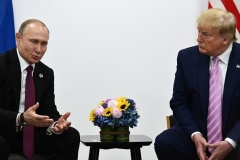
President Trump and Russian President Vladimir Putin at a G20 summit in Osaka in June 2019. (Photo by Brendan Smialowski/AFP via Getty Images)
Moscow (CNSNews.com) – Russian President Vladimir Putin has proposed that the United States and Russia strike a deal prohibiting both countries from interfering in each other’s elections.
In a statement, Putin argued that Washington and Moscow should “exchange guarantees of non-interference in each other’s internal affairs, including electoral processes, including using [information and communication technologies] and high-tech methods.”
The Russian leader also suggested that the two countries reestablish regular interagency dialogue on cyber-security and develop a cyber equivalent to the 1972 U.S.-Soviet Incidents at Sea agreement, which sought to prevent naval confrontations between the two sides by instituting protocols for conduct at sea.
“These measures are aimed at building up trust between our states, promoting security and prosperity of our peoples,” he said. “They will significantly contribute to ensuring global peace in the information space.”
Following the release of Putin’s proposal, Leonid Slutsky, chairman of the State Duma Foreign Affairs Committee, told reporters that “the ball is now in the American court.”
“The degree to which the White House will take the president’s statement seriously will become a serious indicator of objectivity and impartiality for American politicians,” he said.
Queries have been sent to the State Department. However, a senior administration official told Business Insider, “Dialogue like this is obviously hard to take seriously with Russia, China, Iran, or any other party that continues to interfere in our election process.”
The Kremlin first proposed a U.S.-Russian cybersecurity deal in early 2017, shortly after reports that Moscow had meddled in the 2016 presidential election first surfaced. In an attempt to defuse tensions, the Russian foreign ministry suggested the creation of a joint cyber taskforce that would address election interference among other issues.
Although President Trump appeared to express support for the idea following his first meeting with Putin in Hamburg in July 2017, he later distanced himself from the Russian proposal.
Putin’s latest offer for a bilateral cyberspace pact comes amid accusations that Moscow is once again attempting to interfere in the U.S. democratic process. Testifying before the House Homeland Security Committee earlier this month, FBI Director Christopher Wray said Russia was making a “very active” effort to influence the 2020 election, with the intention of sowing discord and “to primarily denigrate Vice President Biden.”
Russia has repeatedly denied intervening in both the 2016 and 2020 campaigns, insisting it has no preference in the U.S. presidential races.
In an article published in the state-run Rossikaya Gazeta on Saturday, Konstantin Kosachev, head of the Federation Council’s Foreign Affairs Committee, argued that Russia has no incentive to meddle in the upcoming election since relations with Washington were unlikely to improve regardless of who won.
“All the bad that could be done has already been done at the level of legislative acts of the Congress, and the White House was only trying to prove that it can no less put its hands on Russia in order to avoid accusations of sympathy for Moscow,” he wrote. “All this will continue under any U.S. president, and any intervention, even if there was a desire and opportunity (and we have neither), loses all meaning.”
Russia has also levied its own accusations of cyber-interference against the United States. Late last month, the Russian Security Council claimed that the U.S. was responsible for up to 75 percent of cyber attacks worldwide between 2016 and 2019.



